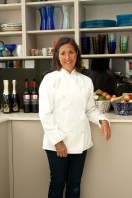
Tine Roche, founder and owner of the Cambridge Cookery School
First food memory?
I was born in Copenhagen and grew up in the Stockholm region of Sweden. My mother’s family live way up north, above the Polar circle, and a lot of my earliest food memories relate to visits to Lapland. My grandmother’s wild blueberry cake is probably the earliest one – it was made from foraged berries from the huge forests where she lived and based on a sweet yeast risen dough. Hunting and foraging was, and still is, a part of life in Scandinavia and other early memories include wild mushroom hunts and delicious winter grouse.
First cookery skills?
I come from a long line of superb female cooks so while I lived at home there was not much incentive to cook – but certainly to eat and I grew up with fantastic everyday food. My interest in cooking started at university. I became rather obsessed with perfecting lemon meringue pie and quiches. Not bad dishes to learn from as they involve several classic skills – pastry, meringue, custard and curd!
Favourite ingredients?
Being Scandinavian I love the taste of pickled and cured foods – balancing vinegar and sugar to create sour and sweet at the same time. Cardamom is a favourite – particularly in baking where I use it in cinnamon rolls, tender buttery biscuits and with chocolate. I also love to use fresh dill with fish and seafood and I add dill to my new potatoes rather than mint. As as artisan baker I love to include caraway and fennel seeds in my breads – again, very Scandi.
Recipes or improvise?
Recipes if particularly intriguing otherwise ad lib. I think people expect chefs not to use recipes but I love poring over beautiful and inspiring cookery books.
Most underrated dish?
Anything involving celeriac and Jerusalem artichokes. It is such a shame that root vegetables are not more appreciated – they are simply sublime when used in mashes and soups. I am also a great fan of cabbage – slow braised, sweet and aromatic red cabbage is a must during the winter months and I love lightly cooked green cabbage with caraway seeds. I also like using cabbage raw in salads. Cheap, nutritious and delicious.
Indispensable kitchen gadget or utensil?
Well it is impossible not to say a good knife but that doesn’t have to equal a very expensive knife. A good knife should sit well in your hand and feel balanced. I also like kitchen scissors and have them at hand for the final stages of jointing birds and filleting fish. And a balloon whisk – when correctly applied just as fast and efficient as electric beaters and leaving you in full control of the texture.
Tell us a top cookery tip?
Plan, prep and make lists! It may sound a tad obsessive-compulsive for home cooking, but it really is the best tip of all. You can then relax when getting ready to serve – all meat improves by prolonged resting and there’s much more time than most home cooks tend to think to finish sauces and side dishes.
Eat at home or eat out?
Like most people who spend their lives cooking I love being cooked for, whether at friends or out. I don’t like overly formal restaurants – great flavours, simplicity, seasonality and a competent but relaxed atmosphere sums up a good restaurant for me. My two favourite countries to eat in are Italy and New Zealand. Italy because of it’s truly seasonal and local food served with such respect and natural confidence. New Zealand for its super cool eateries and great take on modern cooking. I am never happier or more excited about eating than when seated in a contemporary space, overlooking the sea and knowing that I could, should I wish, stay all day and move from superb brunch via a bottle of Pinot to cocktails and supper. My business partner Liz is a Kiwi and I have family out there. It has been amazing to follow the spectacular development on the food scene in recent years.
What’s Britain’s best kept food secret?
Roast potatoes – almost unknown to our fellow Europeans but always a revelation. I also think that our ethnic food shops and restaurants are still largely unknown to visitors. They may be aware of the obvious Indian influences but that tends to be it.
What are the key ingredients for a successful cookery class?
Passion and knowledge – plus planning, planning and more planning! A good class should give completely hands-on experience and run seamlessly. I am pleased only when every class is a roaring success and always strive to give as much as we possibly can to our guests. It is not about showing off one’s own skills but about sharing them and passing them on. I think the rising numbers of cookery schools around the country are a direct result of dwindling cooking at home – the cycle of handing over skills from one generation to the next has been broken. It is hugely positive that so many people find they miss the skills and set out to rebuild them.
Contact: Cookery school Q&A: Tine Roche, Cambridge Cookery School
